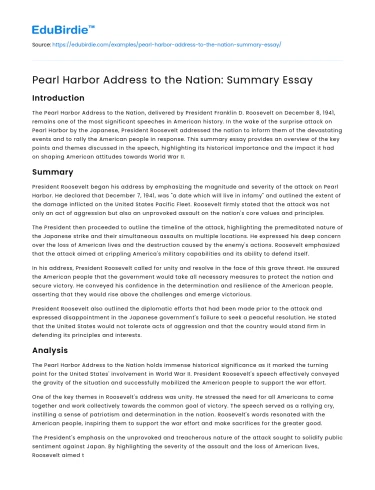Introduction
The Pearl Harbor Address to the Nation, delivered by President Franklin D. Roosevelt on December 8, 1941, remains one of the most significant speeches in American history. In the wake of the surprise attack on Pearl Harbor by the Japanese, President Roosevelt addressed the nation to inform them of the devastating events and to rally the American people in response. This summary essay provides an overview of the key points and themes discussed in the speech, highlighting its historical importance and the impact it had on shaping American attitudes towards World War II.
Summary
President Roosevelt began his address by emphasizing the magnitude and severity of the attack on Pearl Harbor. He declared that December 7, 1941, was "a date which will live in infamy" and outlined the extent of the damage inflicted on the United States Pacific Fleet. Roosevelt firmly stated that the attack was not only an act of aggression but also an unprovoked assault on the nation's core values and principles.
Save your time!
We can take care of your essay
- Proper editing and formatting
- Free revision, title page, and bibliography
- Flexible prices and money-back guarantee
The President then proceeded to outline the timeline of the attack, highlighting the premeditated nature of the Japanese strike and their simultaneous assaults on multiple locations. He expressed his deep concern over the loss of American lives and the destruction caused by the enemy's actions. Roosevelt emphasized that the attack aimed at crippling America's military capabilities and its ability to defend itself.
In his address, President Roosevelt called for unity and resolve in the face of this grave threat. He assured the American people that the government would take all necessary measures to protect the nation and secure victory. He conveyed his confidence in the determination and resilience of the American people, asserting that they would rise above the challenges and emerge victorious.
President Roosevelt also outlined the diplomatic efforts that had been made prior to the attack and expressed disappointment in the Japanese government's failure to seek a peaceful resolution. He stated that the United States would not tolerate acts of aggression and that the country would stand firm in defending its principles and interests.
Analysis
The Pearl Harbor Address to the Nation holds immense historical significance as it marked the turning point for the United States' involvement in World War II. President Roosevelt's speech effectively conveyed the gravity of the situation and successfully mobilized the American people to support the war effort.
One of the key themes in Roosevelt's address was unity. He stressed the need for all Americans to come together and work collectively towards the common goal of victory. The speech served as a rallying cry, instilling a sense of patriotism and determination in the nation. Roosevelt's words resonated with the American people, inspiring them to support the war effort and make sacrifices for the greater good.
The President's emphasis on the unprovoked and treacherous nature of the attack sought to solidify public sentiment against Japan. By highlighting the severity of the assault and the loss of American lives, Roosevelt aimed to evoke a sense of outrage and determination among the American population.
Furthermore, President Roosevelt's address underscored the importance of international cooperation and the need to defend democratic values. He articulated the United States' commitment to working with its allies to defeat the forces of aggression and ensure a just and lasting peace.
Conclusion
The Pearl Harbor Address to the Nation delivered by President Franklin D. Roosevelt served as a defining moment in American history. Through his powerful and eloquent words, Roosevelt united the nation, galvanized public support, and set the course for American involvement in World War II. The speech effectively communicated the gravity of the attack and the need for resilience and determination in the face of adversity. President Roosevelt's address remains an enduring symbol of leadership and resolve, reminding us of the collective strength and spirit that emerged from the ashes of Pearl Harbor.






 Stuck on your essay?
Stuck on your essay?

